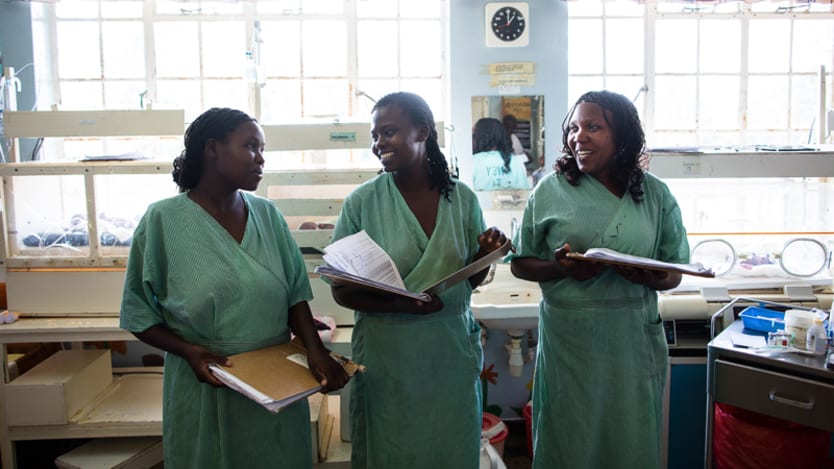
Over the last decade, health experts have achieved relative success raising global awareness surrounding the staggering shortage of health workers in low- and middle-income nations. Yet, the recent Ebola crisis in West Africa reminds us that we are still a long way away from converting awareness into investments for strong, responsive health systems. As Dr. Tedros Adhanom Ghebreyesus, the World Health Organization’s new director-general, emphasized at the G-20 summit: Our global health security is only as strong as its weakest link.
Until recently, little attention had been paid to acknowledging how health and social sector jobs — and underlying education and training — can lead to inclusive economic growth. With annual spending of nearly $6 trillion, the world’s health sector represents an engine of enormous economic opportunity, particularly for women, who hold 70 percent of all health jobs.
While women make up a larger share of health and social workforce jobs, both formally and informally, there are major gender biases and inequities in the sector, with an above-average gender pay gap and under-representation of women in senior management and leadership roles. To close the pay gap and break the glass ceiling, efforts are underway to expand women’s economic empowerment through investments into the health and social workforce.
For example, in Canada, Prime Minister Trudeau plans to commit 95 percent of his country’s foreign aid budget to programs that target gender equality and the empowerment of women and girls. In Liberia, the German development agency, GIZ, is enhancing the role of women in the health sector by ensuring that the institutional and personnel prerequisites are in place to increase women’s economic participation.
Could unemployed youth solve the health care worker crisis?
Forty million new health and social care jobs must be created by 2030 to achieve universal health coverage. At the same time, global youth unemployment has reached 71 million. Could the two problems be used to solve each other?
By 2030, middle- and high-income countries are expected to expand health worker jobs by 40 million — doubling the size of the current workforce. In contrast, there is a shortfall of nearly 18 million health workers to achieve universal health coverage, primarily in low and lower-middle income nations.
How can all countries take the necessary steps to recalibrate their monetary and fiscal policies to invest in health and social workers and achieve inclusive growth?
In May, the 70th World Health Assembly unanimously adopted the joint program #Working4Health, supported by the International Labor Organization, the Organization for Economic Co-operation and Development, and WHO. This Five-Year Action Plan for Health Employment and Inclusive Economic Growth takes a multisectoral and interorganizational approach “to transform the global health workforce so as to be able to meet the needs for achieving the Sustainable Development Goals [SDGs].”
As part of the five-year action plan, three policy positions serve as an important guide for reframing global efforts to address the shortage of health workers and advance UHC and sustainable development:
1. Women: To reduce the gender gap and add up to $6 trillion to the global economy by 2025, nations must eliminate gender biases and inequities for women at work, including in the health labor market. Investments and strategies to improve economic participation and empowerment could be gender transformative.
2. Job creation: To stimulate investments that create decent health and social sector jobs, particularly for women and youth, nations must develop and implement labor market policies to achieve a sustainable health and social workforce.
3. Education: To drive economic growth and avert projected workforce shortfalls, a massive expansion and transformation of quality professional, technical vocational education and training programs is needed. Nations must invest in quality education and continued learning opportunities to ensure all health and social workers have the skills to fully meet local demand today and in the future.
By focusing in on these recommendations, as well as others, we can change the narrative from “crisis” to “opportunity” — one in which health and social sector job creation and employment spurs inclusive growth and drives the achievement of the Sustainable Development Goals. Chief among the recommendations is the need for a laser-like focus on overcoming gender barriers and advancing women’s empowerment.
This month’s G-20 declaration expressed a clear commitment by world leaders “to improve the quality of female employment and eliminate discrimination, reduce gender compensation … and improve women’s access to labor markets through provision of quality education and training.”
As the United Nation’s High-Level Political Forum on Sustainable Development concludes, key stakeholders and actors from across sectors will participate in the Partnership Exchange to share lessons learned toward achieving the SDGs by 2030. The #Working4Health program will highlight how educating and employing health workers can accelerate efforts to achieve SDGs 3 (health), 4 (education), 5 (gender equality), and 8 (decent work for all), and that women are an essential part of the solution to healthier, more equitable societies.
We know that the world’s health and social sector is an economic and jobs engine that has yet to be fully realized. If nations can tap into this potential and reduce gender inequality, they can accelerate broad inclusive growth, close important health workforce gaps, and achieve stronger health systems for all. And at the same time, we can achieve the SDGs and broader development goals.
Join the Devex community and access more in-depth analysis, breaking news and business advice — and a host of other services — on international development, humanitarian aid and global health.








